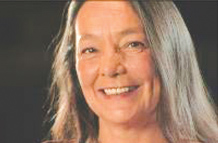
Kandi Mosset

Debra White Plume

Tantoo Cardinal
PORCUPINE, SOUTH DAKOTA –– Native American leaders are preparing a Jan. 15 public meeting at Porcupine, South Dakota, on women’s role in defending Mother Nature against TransCanadas’ tar-sands crude-oil mining and pipelines. At the same time farmers and ranchers are aligning to reform laws to protect land and water from the company’s proposed Keystone XL Pipeline and similar projects in the state’s 87th Legislature. The Canadian company wants to build its second pipeline through South Dakota to ship more of its tar-sands crude-oil from Alberta Province to the southern and central United States for refining and marketing. Four Sioux tribal governments failed in their federal court bid to avert the first pipeline, the Keystone I, which crosses all the eastern counties of the state. After that pipeline had at least a dozen toxic spills in its first year of operations, tribal leaders gathered signatures and submitted a Mother Earth Accord to the White House opposing the second pipeline. “The Keystone XL and Keystone I are a liability to South Dakota’s major revenue sources, agriculture and tourism, and our fresh water resources,” said Winner landowner John Harter, who is a member of Dakota Rural Action, a South Dakota grassroots farm organization that signed the Mother Earth Accord. DRA is drafting legislation to provide for safety and accountability in case the federal government grants a Presidential Permit for TransCanada Corp.’s proposal. The South Dakota Legislature convened on Jan. 10. Canadian First Nations Cree actor and activist Tantoo Cardinal, Indigenous Environmental Network representative Kandi Mosset of the Mandan-Hidatsa-Arikaree community of North Dakota, Bring Back the Way non-profit co-founder Debra White Plume and a panel of Oglala Lakota women announced the “Winyan Ituwan” (Vision of the Women) council to begin at 1 p.m. at the Pahin Sinte School in Porcupine. “Winyan Ituwan is a collective effort to bring women together to share experiences, vision, and wisdom,” they said in a news release. Topics include Mother Earth and water, mining issues on the Great Plains, and roles and responsibilities of Native women,” it said. The Keystone XL Pipeline would run nearly 2,000 miles from Canada to the Gulf of Mexico. It would span Montana, South Dakota and Nebraska, before connecting with the Keystone I Pipeline in Kansas, then proceeding through Oklahoma and Texas. The TransCanada Corp’s response late last year to federal and state government demands for safeguards in Montana and Nebraska has sparked hopes for additional measures in South Dakota. “South Dakotans need to get involved; it’s almost too late,” said Harter, whose land would be used as part of the pipeline route. Montana and Nebraska have each obtained a $100-million security bond from TransCanada Corp. to use if an oil spill is not adequately cleaned up. “TransCanada is pleased with the positive conversations it is having with Nebraska leaders, which have resulted in legislation that respects the concerns of Nebraskans and supports the development of the Keystone XL pipeline,” the company said in a news release. TransCanada Corp. volunteered to post the Nebraska bond when the state Legislature went into special session for the single issue of passing a law to ensure the Keystone XL Pipeline route be moved away from the Ogallala Aquifer and Sand Hills ecosystem. The U.S. EPA had approved the route, but local pressure on the Nebraska government resulted in State Department requirements for reassessment. Dakota Rural Action’s lobby for a much smaller $30 million cleanup fund to be used for both Keystone pipelines has floundered in three consecutive legislative sessions, due in part to opposition by TransCanada Corp. “It’s time for South Dakotan legislators to put a line in the sand and refuse to stop selling ourselves short, expecting if we act nice, TransCanada will treat us nice.,” DRA said in a news release. “The evidence has mounted and it is clear, we won’t get proper protections unless we demand it.” TransCanada Corp. says it can provide a secure source of U.S. energy and jobs with the $13 billion Keystone pipeline investment. “The U.S. consumes 15 million barrels of oil each day and imports 10 to 11 million barrels per day,” It says in a news release. “Industry forecasts predict oil consumption will continue at these levels for the next two to three decades, so a secure supply of crude oil is critical,” it notes. The Keystone XL Pipeline would put a total of 13,000 people to work in construction, according to the company. It would create an additional 7,000 manufacturing jobs in the United States, and local businesses along the Keystone XL route would experience a demand for 118,000 spin-off jobs, it says. The U.S. State Department and independent analysts put the job creation figure lower, at as little as 6,000 temporary positions all-told, the vast majority of them transient and temporary. “TransCanada will tell people what they want to hear,” said Paul Seamans, a DRA member and owner of land crossed by the Keystone XL Pipeline route near Draper, South Dakota. “The inflated promises of jobs and increased tax revenues seem to be more important than protecting South Dakota landowners from the bullying tactics of a foreign corporation,” he said. DRA’s main priorities for the legislative session are creating a large bond from oil companies to ensure proper clean-up of an oil spill and reforming South Dakota’s eminent domain laws. The non-profit will help introduce legislation that is similar to the bonds Montana and Nebraska have received. “This will be one more step to ensure South Dakota landowners and taxpayers are not stuck with a clean-up bill,” DRA’s news release says. In conjunction with South Dakota Stockgrowers, DRA is proposing legislation to remove the old requirements for railroad eminent domain. The reform would require a big, Keystone-style pipeline or railroad to: 1) have permits granted before condemning land; 2) use eminent domain as a last resort after acquiring most of the land needed through good faith negotiations; 3) meet a time limit on negotiations and comply with a “use it or lose it” clause so a landowner’s property won’t be needlessly restricted if a project fails to proceed. The Winyan Ituwan gathering includes Regina Brave, who plans to speak of her experiences at Wounded Knee Occupation for 71 days in 1973; Marilyn Charging Crow, Vivian Locust and Arlette Loud Hawk,who plans to speak as the Whip Bearer for the Tokala Kit Fox Warrior Society. Scheduled special guest speakers include Marie Randall and Lily Mae Red Eagle. Pte San Win plans to serve as master of ceremonies. Cardinal will speak on the tar-sands oil mining impacts in her homelands of Ft. McMurray, Canada. Mosset plans to speak on the pipeline, oil development in North Dakota, and the U.N. Climate Convention she attended in Durban, South Africa in December. White Plume plans to provide updates on pipeline opposition, as well as her involvement as the lead plaintiff in the cases against Cameco, Inc. and PowerTech, Inc., which promote uranium mining near her Pine Ridge Indian Reservation and in the Black Hills, respectively. Cardinal, Mosset and White Plume were among 1,200 people arrested at the White House in a 2011 mass civil disobedience to raise awareness of opposition’s reasons for trying to bar the Keystone XL Pipeline permit. Their program on Jan. 15 features a slideshow of the tar-sands crude-oil mining in Canada, and a 10 minute video short of the documentary Crying Earth Rise Up! about uranium mining in Lakota Territory by Prairie Dust Films. An open microphone is being provided “for women to express themselves and offer words of wisdom to the young generations,” organizers said. They plan to serve supper, while Tiana Spotted Thunder of Independence Through Music, and the group Scatter Their Own share their songs and music. Door prizes include fire wood, propane, and jewelry. Winyan Ituwan is the first of four women’s gatherings slated by the group, with others set for spring, summer and fall. “All women are encouraged to attend,” organizers said, adding, “The gathering is open to the men who want to hear the voice, vision and wisdom of the women.” For more information, people can call (605) 899-1419 or connect at Winyan Ituwan on Face Book. (Talli Nauman is Health and Environment editor for Native Sun News. Contact her at talli.nauman@gmail.com)
Join the Conversation
